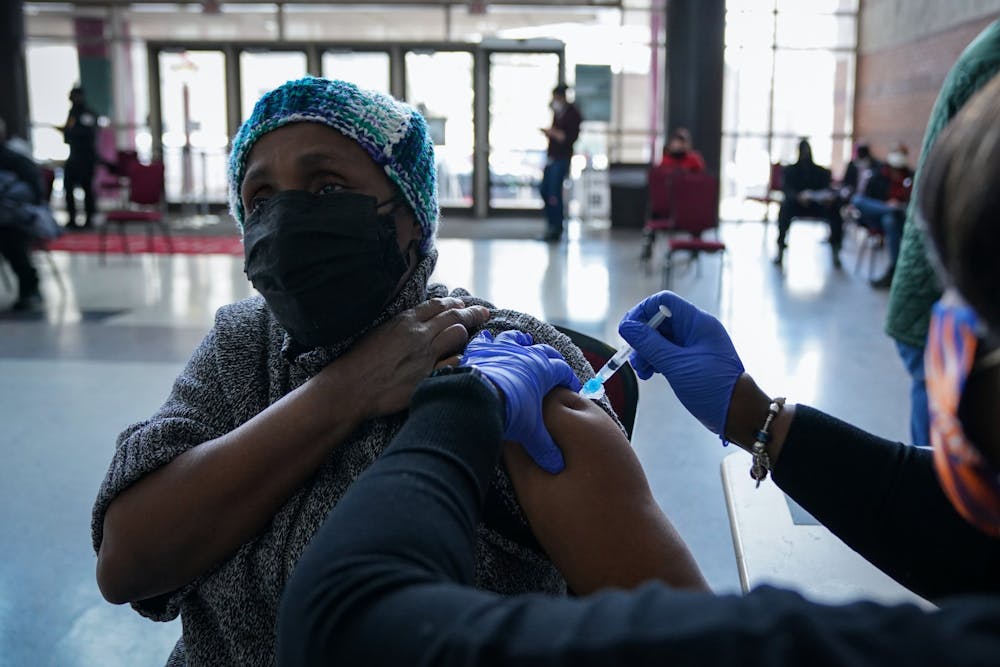
Over the past few weeks, being able to receive a COVID-19 vaccine has become as revered as winning a golden ticket to Willy Wonka’s Chocolate Factory. The event is often chronicled by many on their social medias, posing with their vaccination cards as one would with an “I Voted” sticker. As I saw such posts circulating my own feed, I wondered how Penn students were able to receive the vaccine at a relatively early time. It was then I realized some, not all, but in numbers large enough for concern, Penn students were taking advantage of vaccine clinics intended for West Philadelphia’s Black residents, an act which I believe is a flagrant display of privilege and lack of social awareness within the Penn student population. This has also enabled classism in vaccine distribution within the Philadelphia community between the poorer, Black residents, who have historically had their agency reduced, and Penn students who are able to advocate for themselves.
The Black Doctors COVID-19 Consortium is a Philadelphia-based organization with the mission of “reducing the incidence of disease and death from coronavirus” in the Philadelphia Black population. Since the project began, founder Dr. Ala Stanford has been in the streets of Philadelphia’s poorest neighborhoods, bridging the gap in accessibility to COVID-19 testing and vaccines attributed to a lack of government efficiency. On March 1, 2, and 6, the BDCC vaccinated people for a total of 18 hours across the three days. According to the BDCC website, the requirement for vaccination is Phase 1B eligibility and legal residence in any of the hardest-hit Philadelphia zip codes — of which Penn is one. With Penn students receiving vaccines, however, it would seem the 1B eligibility requirement is less enforced.
The need for prioritization in vaccine distribution for Black Philadelphians is clear. Since the beginning of the pandemic, we have seen how COVID-19 can be significantly more life-threatening for Black people, with a mortality rate nearly six times higher than that of white people who contract the illness. With a 41% Black population that is also twice as likely to live in poverty as white Philadelphians, the threat of COVID-19 to Philadelphia becomes all the more real. Such discrepancies in health outcomes are the reason for initiatives like the BDCC and their focus on the Black community.
To not see the issue in going to vaccine clinics intended on vaccinating poor, year-round Black residents of West Philadelphia serves as a contradiction to the “wokeness” Penn students have exhibited in their social spheres. Structural racism is not just limited to Black death at the hands of law enforcement. It also comes in the form of restricted access to affordable healthcare. And if a Black person is able to receive that healthcare, chances are it is impacted by some degree of prejudice in the way a doctor may choose to believe or not believe the symptoms they describe to them. Thus the warranted distrust many Black individuals feel towards our healthcare system necessitates such efforts like the BDCC. Being committed to anti-racism means understanding how pervasive racism is in our country, and actively working to combat it. Stealing vaccine doses intended for Black Philadelphians at BDCC sites is to enable this oppression; some Penn students have effectively become the oppressor they have been so vocal in denouncing in the newfound trend of social media activism.
Penn students are part of a larger nationwide trend in exploiting such vaccination programs. In desperation for COVID-19 vaccines and met with the unresponsiveness of state health departments, non-Black citizens are flocking to less-restrictive and more accessible vaccination sites intended for Black people. What these individuals do not realize is that without the work of organizations like the BDCC, many Black Philadelphians would never receive a vaccine.
This is not the case for other communities like Penn, who may be able to receive vaccines through the University as early as May of this year. The pandemic and subsequent efforts to vaccinate at-risk communities have given Penn students the opportunity to show up as allies off of their social media pages, and yet when the time came to do so, they failed.
Wealthy, privileged, non-Black Penn students and their Canada Goose jackets waiting in line for vaccines from the Black Doctors COVID-19 Consortium is irony in its cruelest form, perpetuating systemic classism that keeps communities like West Philadelphia in poverty and sickness. Understand your position, understand your privilege, and before you walk into that vaccine clinic ask yourself: am I taking a vaccine from someone who needs it more than I do? Chances are, if you’re a healthy, college-age student who has been following Penn’s Student Campus Compact, the answer is yes. And if you are too disillusioned to understand that, maybe you aren’t as “woke” as you think you are.
ALEX EAPEN is a first year in the College from Elkridge, Md. His email is aeapen@sas.upenn.edu.
The Daily Pennsylvanian is an independent, student-run newspaper. Please consider making a donation to support the coverage that shapes the University. Your generosity ensures a future of strong journalism at Penn.
Donate




